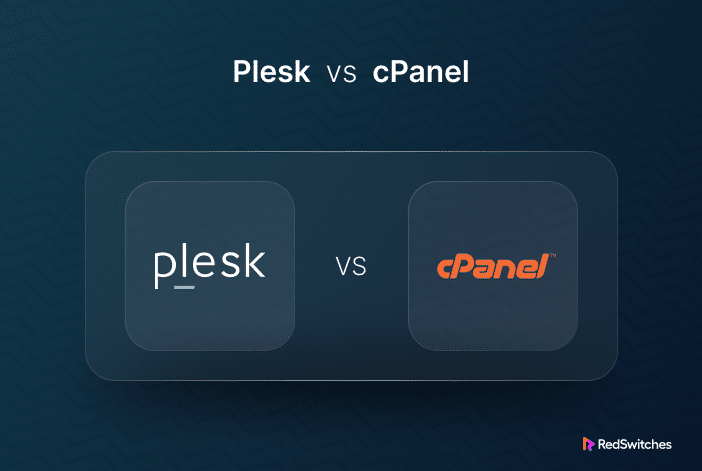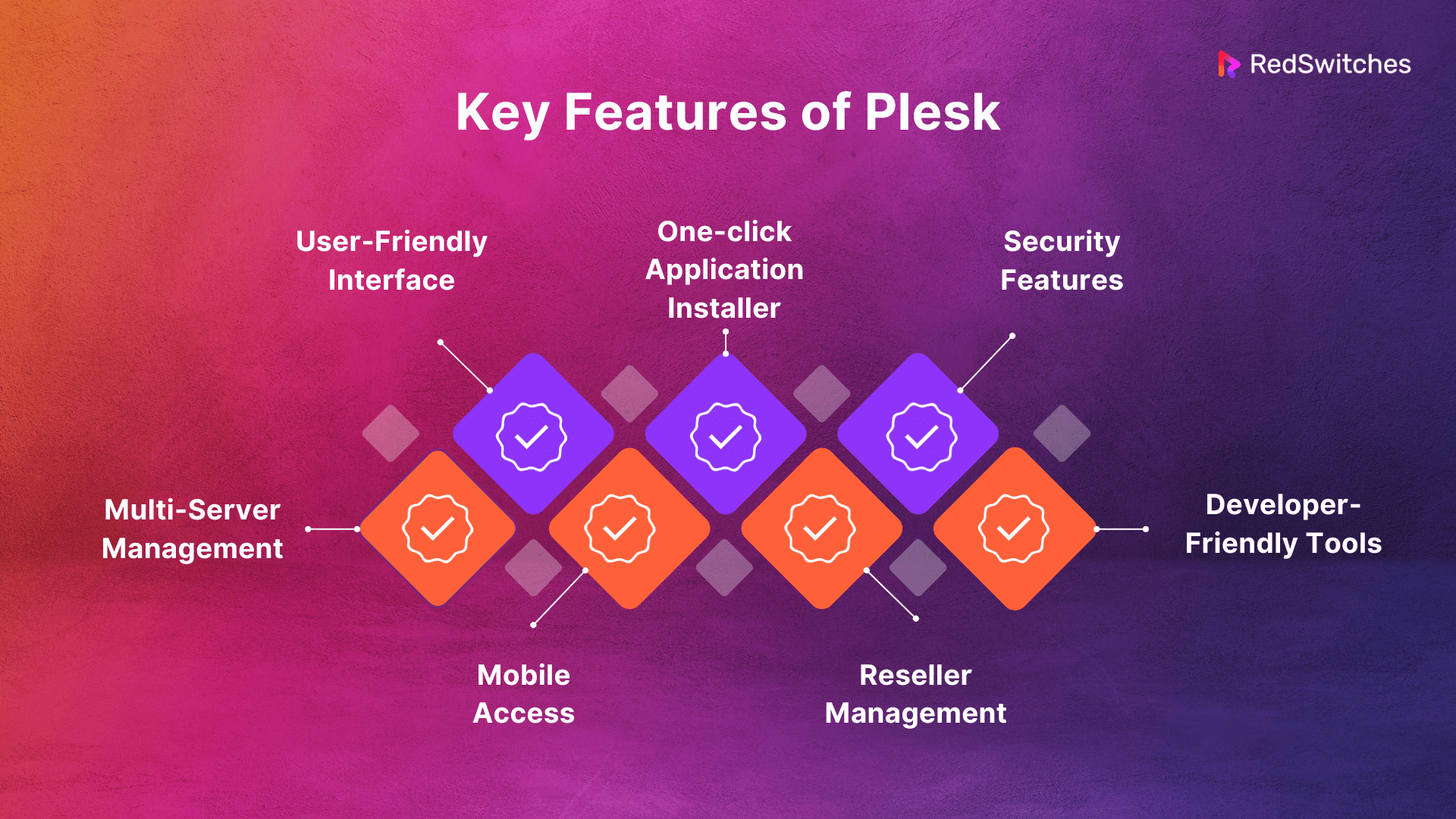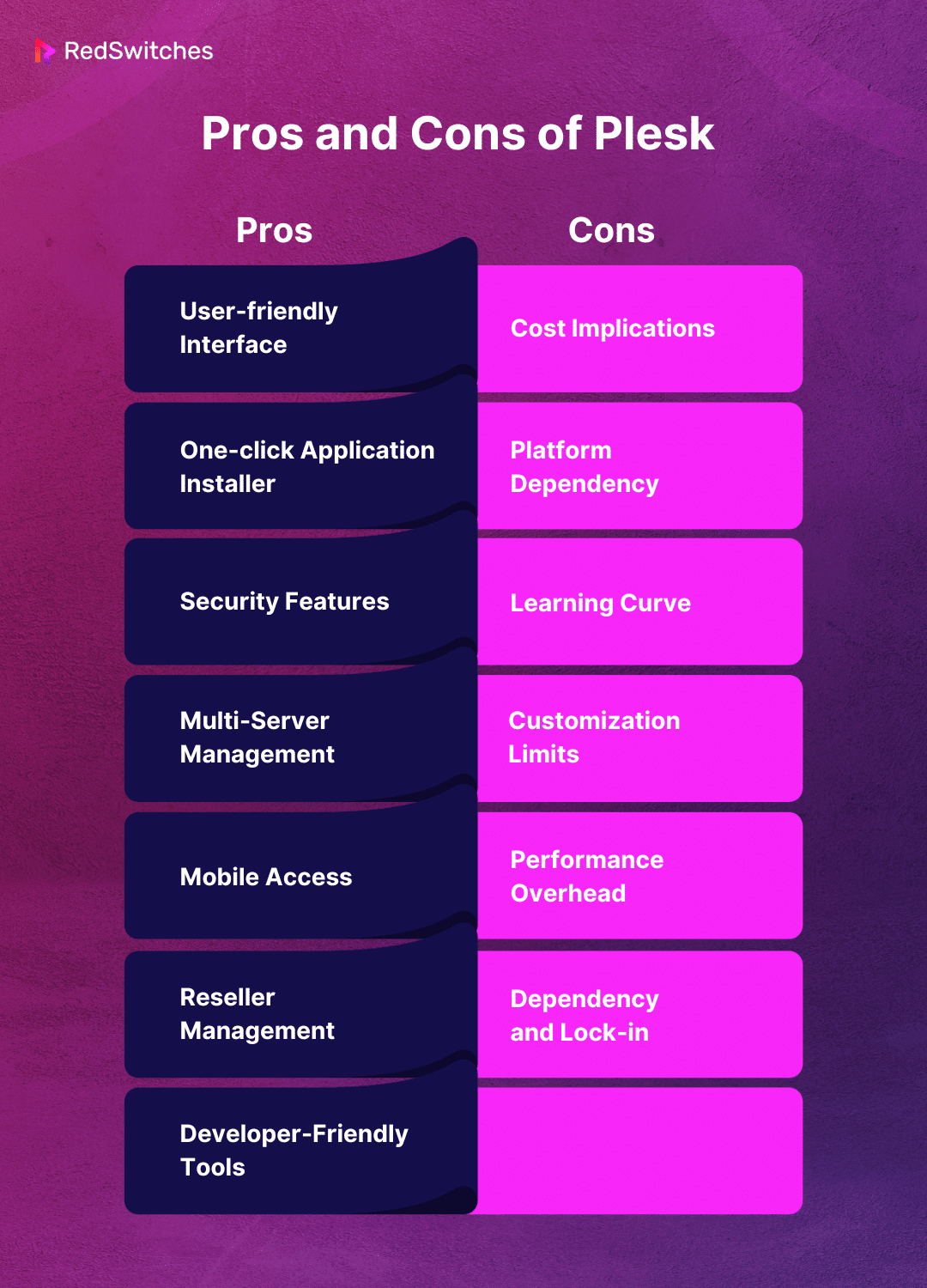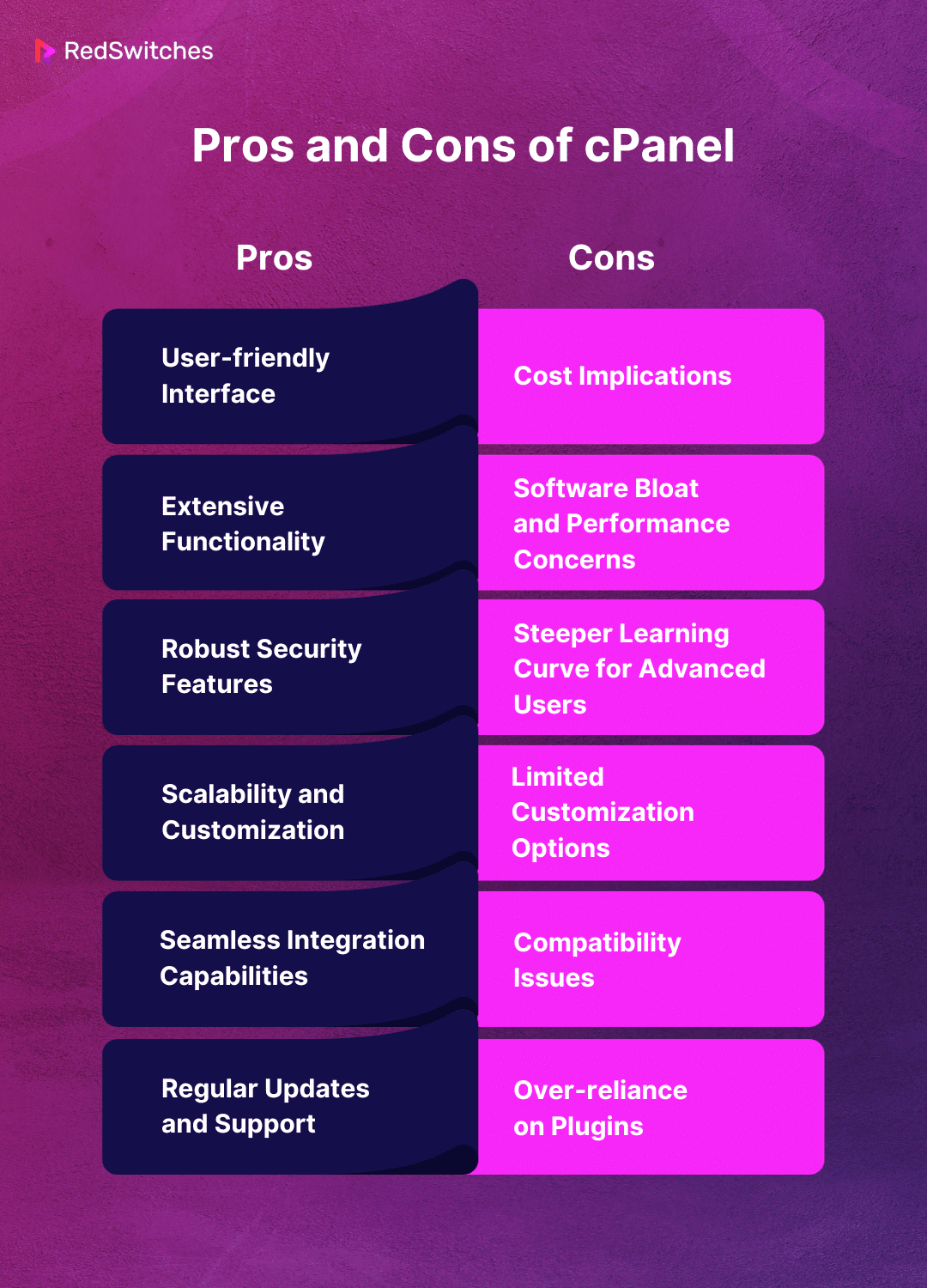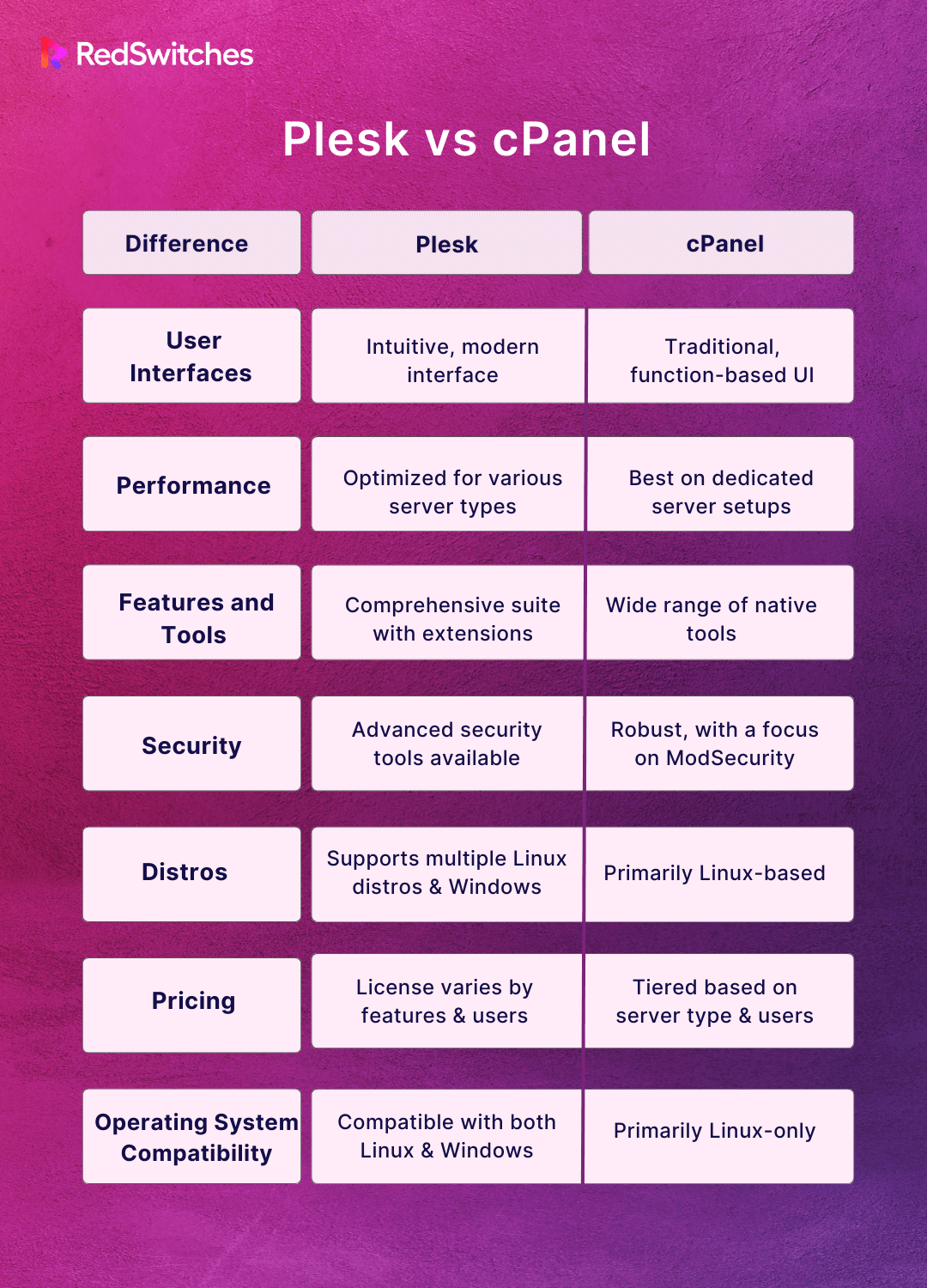With an increasing number of businesses and individuals establishing an online presence in today’s digital era, the significance of a quality hosting control panel cannot be understated. Control panels simplify the management of servers and sites for users, eliminating most of the technical complexity.
When talking about control panels, two of the most popular control panels dominating the market are Plesk and cPanel. Both Plesk and cPanel collectively occupy approximately 98% of the market share. Plesk comes first with 84.26% market share, as per Datanyze.
One thing to remember when determining which control panel between Plesk vs cPanel is best for you is that while one control panel may be best for a user, it may not be suitable for the other. Determining which control panel to select between Plesk and cPanel requires comparing the differences between Plesk vs cPanel.
This blog aims to highlight this difference and help readers choose the best control panel for their needs and requirements.
- What is a Control Panel?
- What is Plesk?
- What is cPanel?
- Plesk vs cPanel: How Are They Different?
- cPanel vs Plesk: Which Web Hosting Control Panel to Pick?
- Conclusion – Plesk vs cPanel
- FAQs
What is a Control Panel?
Before we dive into comparing Plesk vs cPanel, it’s important to understand what a control panel is. A control panel refers to a web-based interface offered by hosting companies that enable users to manage several aspects of their web services, from establishing email accounts and domains to installing web applications. These interfaces save users from the complex and tedious task of directly handling server configurations or coding.
What is Plesk?
Credits: Shutterstock
Plesk is a web hosting control panel that allows users to manage their websites, domains, databases, email accounts, and more from a single, intuitive interface. Developed by Plesk International GmbH, it has grown in popularity due to its flexibility. The control panel can be used on Windows and Linux servers.
This cross-platform capability is a significant advantage for individuals working in mixed environments. Plesk offers a streamlined dashboard focusing on security, simplicity, and functionality.
Key Features of Plesk
Below are the key features of Plesk. Understanding these features will allow you to determine whether Plesk’s features align with your needs and requirements.
User-Friendly Interface
Plesk boasts an intuitive and clean interface designed with a focus on usability. This interface allows beginners to navigate different sections and accomplish tasks quickly. The organized layout ensures that tools and settings are easily accessible, minimizing the time wasted searching for specific functionalities.
One-click Application Installer
Plesk allows users to install many applications with a single click. The range is vast, from popular CMS platforms like WordPress and Joomla to e-commerce solutions like Magento. This simplifies the site development process, empowering even those without extensive technical knowledge to set up and manage their websites.
Security Features
Plesk has built-in robust security measures to safeguard sites from potential threats. Features like the fail2ban intrusion prevention, Plesk firewall, and automatic updates help protect your website. Plesk also offers an extension called ‘Plesk Security Advisor,’ enabling SSL certificates easily and ensuring secure connections.
Multi-Server Management
Plesk provides the convenience of controlling multiple servers from a single dashboard. This multi-server management feature streamlines tasks and ensures consistent configurations across servers, making the administrative process more efficient and less prone to errors.
Mobile Access
Plesk offers on-the-go access through a mobile app that allows administrators to manage their server environment directly from their smartphones. This flexibility ensures that urgent tasks or issues can be addressed immediately – regardless of location.
Reseller Management
Plesk is equipped with tools with a focus on hosting resellers. These tools allow resellers to create and manage multiple accounts with various access levels. This feature is particularly beneficial for businesses that offer web hosting services, providing them with a structured system to handle their clientele.
Developer-Friendly Tools
Developers will appreciate the plethora of tools Plesk provides. From Git integration, which allows for easy version control, to support for multiple PHP versions and Docker support, developers have the resources to optimize their projects seamlessly.
Pros and Cons of Using Plesk
Below is a list of the pros and cons of using Plesk:
Pros
User-Friendly Interface
Plesk offers an intuitive and user-friendly interface, making it easier for users to navigate its features. Whether you are a seasoned developer or a beginner, its clean design ensures you find the tools and settings you need without any hassle. Plesk also offers a consistent experience across various operating systems.
Multi-Language Support
Understanding the global nature of web hosting, Plesk has incorporated multi-language support, catering to users from different regions. You can manage your server and sites in a language you’re comfortable with, helping boost user experience and minimizing misunderstandings. This feature emphasizes Plesk’s commitment to accessibility and its aim to cater to diverse users.
Advanced Security Measures
Security is paramount in the digital world, and Plesk doesn’t compromise. It offers an extensive suite of security tools, including the Plesk firewall, fail2ban intrusion prevention, and active monitoring of system components. The platform facilitates easy SSL certificate installations, ensuring encrypted connections and protecting sensitive data.
One-Click App Management
Plesk simplifies the website management process with its one-click application installations. From setting up a WordPress blog and an e-commerce platform to creating a personal portfolio, the web hosting control panel has a range of applications available for every task. The streamlined installation process eliminates complicated setups and allows even newcomers to set up their site.
Scalability and Extensions
Plesk’s architecture is designed for scalability. It accommodates the needs of different users. Whether managing a single website or overseeing multiple sites, Plesk scales effortlessly. The Plesk Extensions Catalog allows users to add functionalities to their control panel, customizing it to suit their unique requirements better.
Integrated Developer Tools
Developers will appreciate Plesk’s integrated tools and utilities. From Git support, allowing easy version control and repository management, to Docker support, facilitating containerized app management, the hosting control panel is committed to aiding developers in their tasks. It also supports various programming languages, ensuring flexibility and versatility.
Cons
Cost Implications:
One of the key concerns with Plesk is its cost. Unlike some control panels that offer free versions, Plesk requires a monthly subscription. The costs can accumulate, especially for enterprises or multiple domain management. This recurring cost can be a significant part of their budget for startups or individual developers, which may encourage them to consider other cost-effective solutions.
Platform Dependency
Plesk was initially developed for Windows and later tweaked to support Linux. This means there’s an inherent inclination towards Windows in its features and functions. Users might find that certain features are optimized for Windows, potentially leading to compatibility or performance issues on other platforms. Ensuring parity across all platforms can sometimes be challenging.
Learning Curve
While Plesk offers a modern and intuitive interface, newcomers may still experience a steep learning curve. The extensive features and settings can overwhelm those unfamiliar with hosting environments. Documentation, while comprehensive, can sometimes be technical, requiring users to invest time in understanding and troubleshooting.
Customization Limits
While Plesk is known to be versatile, it does come with limitations in regards to customization. Users looking to customize the panel beyond its standard offerings might be constrained. This can be especially limiting for advanced users accustomed to granular control over their environment – a feature that raw server management may offer.
Performance Overhead
Plesk can introduce performance overhead on a server. This can sometimes translate into slower response times or lower efficiency for servers with limited resources. Web hosts need to ensure they have significant server resources to run Plesk without impacting the performance of hosted websites.
Dependency and Lock-in
Plesk creates a certain level of dependency due to its unique ecosystem. Transitioning from Plesk to another control panel or a manual server management setup can be challenging and time-consuming. This lock-in can deter those who may have to switch platforms in the future.
Also Read: How To Pick the Right Dedicated Server Specs [Ultimate Guide].
What is cPanel?
Credits: Shutterstock
cPanel is a popular web-based hosting control panel designed to enable site owners to manage their web properties from a user-friendly interface. It offers tools to manage hosting features, including managing databases, creating backups, viewing statistics, managing domains and subdomains, etc.
With its graphical interface and organized layout, cPanel enables users without extensive technical knowledge to control nearly every aspect of their hosting environment. This makes it a favored choice among many web hosting providers and users.
Key Features of cPanel
Below are the key features of cPanel. Understanding these features will enable you to determine whether cPanel features align with your needs and requirements.
User-Friendly Interface
cPanel boasts a straightforward and intuitive graphical interface. This makes site management accessible for those without deep technical expertise. Icons are organized logically, ensuring users can easily find the functionality they seek. Even if one is unfamiliar with website hosting, cPanel’s design makes it relatively easy to learn and navigate.
Domain Management
cPanel simplifies domain and subdomain management. It allows users to set up and control multiple domains from a single account. Whether redirecting domains, setting up parked domains, or managing DNS zones, cPanel has tools to handle these tasks efficiently. This centralized management is invaluable for businesses or individuals with multiple web properties.
Email Management
With cPanel, users can smoothly create and manage email accounts associated with their domains. Email forwarding, autoresponders, and customizable spam filters enhance email functionality and user experience. cPanel’s built-in Webmail allows users to access their emails from any device, anywhere.
File Management
The in-built File Manager in cPanel is a powerful tool for managing and editing site files without FTP. Users can delete, upload, edit, and move files within the interface. Backups can be created and restored, ensuring website data is safe and recoverable.
Database Management
cPanel simplifies the process of creating and managing databases. With tools like phpMyAdmin, users can interact with their MySQL databases, making tasks including importing data or running SQL queries easier. Integrating these tools ensures that database management remains hassle-free, even for individuals not well-versed in SQL.
Security Features
Security is integral online. cPanel recognizes this need by allowing users to easily set up SSL certificates, manage SSH keys, and configure IP blockers. Tools like Hotlink Protection and Leech Protection help prevent unauthorized access or use of website resources.
Pros and Cons of Using cPanel
Below are the top pros and cons of cPanel:
Pros
User-Friendly Interface
One of the standout features of cPanel is its intuitive and user-friendly interface. Users with a limited understanding of technology can also easily navigate the panel. The platform is designed clearly, ensuring users can locate and utilize the necessary tools without hassle.
Extensive Functionality
cPanel boasts a comprehensive range of functionalities, catering to various web management needs. From email setup, domain management, and database creation to security features and software installations, cPanel covers many tasks. Its rich feature set ensures that web administrators have all the tools they need at their fingertips.
Robust Security Features
cPanel is focused on the security needs of this digital age. The platform incorporates several security tools, including IP blockers, SSL certificate installations, and two-factor authentication. These features bolster site protection, instilling confidence in users about the integrity of their online assets.
Scalability and Customization
cPanel’s flexibility is one of its unsung strengths. It can adapt to the needs of both small-scale blogs and large commercial sites. As your website grows and evolves, cPanel’s myriad plugins and extensions ensure you can customize and scale your web management tools accordingly.
Seamless Integration Capabilities
cPanel integrates with numerous third-party applications and software. This interoperability ensures users can enhance their site’s features, incorporate various functionalities, or even integrate billing systems like WHMCS without compatibility issues.
Regular Updates and Support
The cPanel team is consistently dedicated to refining and improving the platform. The platform is regularly updated, allowing users access to the latest features, security patches, and improvements. cPanel’s extensive community and support system ensures that help is always available through forums, documentation, or customer service.
Cons
Cost Implications
cPanel is not a free solution. These costs can add up for those managing multiple sites or servers, making cPanel more expensive than other free or lower-cost control panel alternatives.
Software Bloat and Performance Concerns
While cPanel offers many features, not every user needs all of them. This abundance of tools can sometimes lead to software bloat, potentially affecting server performance. Updates to the platform sometimes introduce features that may not be necessary for all users, consuming valuable resources that could be better used elsewhere.
Steeper Learning Curve for Advanced Users
Beginners often appreciate cPanel’s user-friendly interface. Advanced users might find certain tasks over-simplified, making more complex operations harder. Although great for basic tasks, the structured environment can sometimes hinder those looking to perform advanced server management or custom configurations outside the standard cPanel offerings.
Limited Customization Options
While cPanel is highly functional, it doesn’t offer extensive customization options for its appearance or layout. Brands or businesses looking to provide their users with a unique, branded experience may find cPanel’s customization limitations a hindrance.
Compatibility Issues
cPanel is primarily designed for Linux-based hosting environments. Those using Windows servers will find that cPanel is not natively compatible. This makes other control panel solutions better suited for Windows hosting a better option for such users.
Over-reliance on Plugins
While cPanel offers several functions, some advanced features or specific needs require third-party plugins. Relying on these plugins can sometimes introduce compatibility issues, especially during cPanel updates. It also means additional research, installation, and possibly added user costs.
Now that we have discussed the definitions of Plesk and cPanel and gone over their features and pros and cons, let’s compare the differences between Plesk panel vs cpanel.
Also Read: Dedicated Servers Unmanaged: 6 Things You Must Know.
Plesk vs cPanel: How Are They Different?
When determining whether Plesk or Cpanel is the better option, comparing the differences between Plesk vs cPanel can offer valuable insight.
Plesk vs cPanel: User Interface
Plesk
Plesk offers a clean, intuitive, modern interface. The dashboard is incredibly easy to navigate, with all the essential tools and features grouped logically, allowing easy navigation. Plesk’s design is consistent across Windows and Linux, making it easier for users working on multiple platforms. Plesk provides a mobile app that allows users to manage their servers and sites on the go.
cPanel
While highly functional, cPanel’s interface is often considered sleeker than Plesk’s. Its tiered layout boosts features categorized into sections like ‘Files,’ and ‘Databases.’ Though straightforward, newcomers might find it slightly overwhelming due to the many upfront icons. cPanel’s appearance can also vary based on the hosting provider since they can customize its look and feel.
Plesk vs cPanel: Performance
Plesk
Plesk tends to have a lighter footprint and works efficiently across various server configurations. It’s adaptable to both Windows and Linux servers. Performance is generally smooth, but like any platform, it can be influenced by the underlying server resources and setup.
cPanel
cPanel is exclusively designed for Linux servers, and its optimization for this platform ensures consistent performance. It’s robust and can handle many simultaneous operations without significant lag, given that the server resources are adequate.
Plesk vs cPanel: Features and Tools
Plesk
Plesk is renowned for its versatility. It supports both Windows and Linux, offers integrated WordPress management (with the WordPress Toolkit), and provides tools for resellers. Extensions are available for additional functionality, including security enhancements and SEO tools. Plesk integrates seamlessly with various platforms like Docker, GitHub, and more.
cPanel
cPanel focuses intensely on its Linux user base. It comes with WHM (Web Host Manager) for server-level configurations and management. cPanel excels in domain management, email hosting, and database management.
The software also provides a marketplace where users can purchase and install additional software and scripts. One of cPanel’s standout features is the ‘EasyApache’ tool, allowing users to configure the Apache web server effortlessly.
Plesk vs cPanel: Security
Plesk
Plesk is known for its powerful security features. With the Plesk Obsidian, their latest version, they’ve integrated a range of security measures. Features like the Plesk firewall, fail2ban intrusion prevention, and mod_security are installed by default. Users can purchase the Plesk Premium Antivirus and ImunifyAV for enhanced security solutions.
cPanel
cPanel, especially with the WHM (Web Host Manager), provides an array of security functionalities. Features like IP Deny Manager, HotLink Protection, and SSH access for secure web sessions are native. They also have integrated ModSecurity and offer automatic SSL installation for all domains, ensuring data encryption.
Plesk vs cPanel: Distros
Plesk
Plesk features a more extensive range of supported operating systems. It’s compatible with both Windows and a variety of Linux distributions. This includes but isn’t limited to CentOS, Debian, Ubuntu, and even RHEL (Red Hat Enterprise Linux).
cPanel
cPanel was exclusive to Linux distributions, particularly CentOS. With the recent developments, cPanel has expanded its support to other Linux distros like CloudLinux and AlmaLinux, especially after the end-of-life announcement of CentOS 8. But unlike Plesk, cPanel doesn’t support Windows.
Plesk vs cPanel: Pricing
Plesk
Plesk offers a varied pricing model featuring different editions tailored to the needs of different users: Web Admin, Web Pro, and Web Host. Their pricing is scalable and provides options for dedicated servers and VPS. Including the WordPress Toolkit, a powerful feature in Plesk, might influence the cost, especially if one opts for advanced versions.
cPanel’s pricing underwent a significant change recently. Instead of a flat-rate pricing structure, they’ve shifted to an account-based pricing model. This means the number of accounts hosted determines the cost. This might increase the expenses for businesses or resellers with numerous accounts. It can be cost-effective for smaller enterprises or individual users.
Are you looking for cheaper cPanel alternatives? Explore the 5 Best cPanel Alternatives (& Cheaper in our informative blog.
Plesk vs cPanel: Operating System Compatibility
Plesk
One of the main advantages of Plesk is its cross-platform compatibility. It’s one of the few control panels that can run on Windows and Linux servers. This makes it a versatile choice for administrators who work with or switch between different operating systems.
cPanel
cPanel is primarily designed for Linux-based servers. It runs on systems like CentOS, CloudLinux, and Red Hat Enterprise Linux (RHEL). While this might seem limiting, it’s worth noting that Linux hosts most of the world’s websites. cPanel’s singular focus on Linux has allowed it to fine-tune its performance and integration with this popular OS, making it a top choice for many Linux administrators.
cPanel vs Plesk: Which Web Hosting Control Panel to Pick?
Credits: Shutterstock
When comparing Plesk vs cPanel, individuals may find it challenging to decide which web hosting control panel to use. Below are a few factors to consider when choosing between Plesk vs cPanel to help streamline decision-making:
Operating System Compatibility
- Plesk: One of Plesk’s significant advantages is its compatibility with Windows and Linux, making it versatile for different server environments.
- cPanel: cPanel was exclusively for Linux. However, its companion, WHM (Web Host Manager), is designed for server administration and provides a comprehensive toolset, albeit for Linux servers.
User Interface
- Plesk: Plesk offers a cleaner, more modern UI. It’s often perceived as more intuitive, especially for those new to web hosting.
- cPanel: While cPanel maintains a somewhat dated interface, its straightforward layout and organization are tried and tested, favored by long-term users for its familiarity.
Features and Extensions
- Plesk: Plesk comes with a built-in WordPress Toolkit, making it easier for users to manage WordPress sites. It supports Docker, providing access to many modern development tools.
- cPanel: cPanel offers a rich library of features, with the added advantage of having WHM for more in-depth server management. Its ecosystem is vast, supported by many plugins and third-party integrations.
Security
- Plesk: Plesk has made significant strides in security with features like Fail2Ban, active system monitoring, and its firewall.
- cPanel: cPanel, with WHM, offers robust security features, including IP address denials, SSL/TLS status checks, and more.
Pricing
- Plesk: Plesk’s pricing varies based on the tier and features. This offers a flexible model that can be more pocket-friendly for smaller-scale users or specific needs.
- cPanel: cPanel often has a more standardized pricing structure, which can be relatively higher, especially for smaller operations or individual users.
Credits: FreePik
Conclusion – Plesk vs cPanel
When comparing Plesk vs cPanel, the final decision depends on your needs, preferences, and the server environment you’re most comfortable with. Both control panels have pros and cons, with Plesk offering a more user-friendly interface for beginners and cPanel boasting extensive features loved by advanced users.
No matter which hosting control panel you lean towards, the essence remains in having a robust hosting platform as a foundation. If you’re searching for a reliable hosting solution that complements either of these control panels, consider checking out the exceptional services of RedSwitches.
With our stellar support and top-tier infrastructure, you can get the most out of your chosen control panel, ensuring an optimized website management experience. So what are you waiting for? Get in touch with us now!
FAQs
Q. Which is best, cPanel or Plesk?
When comparing Plesk vs cPanel, the ideal choice depends on individual preferences and requirements. Both are top-tier web hosting control panels with their own advantages. cPanel is popular for its extensive features and familiarity among long-time users, while Plesk offers a more intuitive interface, especially for beginners.
Q. Is Plesk the same as cPanel?
No, Plesk and cPanel are different web hosting control panels. While they serve similar core functions, aiding in website and server management, their offerings may differ. When deciding between Plesk vs cPanel, it’s crucial to understand these distinctions to make an informed choice.
Q. Is Plesk free or paid?
Plesk is a paid control panel solution. While its pricing can vary based on the features and license type you choose, it’s important to remember that investing in a quality control panel like Plesk can offer several advantages, including ease of use and functionality, especially when comparing Plesk vs cPanel and others alternatives in the market.
Q. What is the difference between cPanel and Plesk?
cPanel and Plesk are both popular web hosting control panels used to manage server and website hosting. The main difference is that cPanel is designed to work with Linux-based servers, while Plesk can work with both Linux and Windows servers.
Q. Which operating systems do cPanel and Plesk support?
cPanel is compatible with Linux servers, particularly CentOS, while Plesk supports both Linux and Windows operating systems.
Q. What are the key differences between cPanel and Plesk?
The key differences between cPanel and Plesk include the operating systems they support, their user interfaces, and the features they offer for hosting management.
Q. Do cPanel and Plesk both offer a graphical user interface?
Yes, both cPanel and Plesk provide a graphical user interface to manage hosting accounts, server settings, and website configurations.
Q. Is there a difference in pricing between Plesk and cPanel?
Yes, there are pricing differences between Plesk and cPanel. Plesk offers various pricing options, including editions for web professionals, whereas cPanel pricing is based on a per-account model.
Q. What features are included in Plesk that are not present in cPanel?
Plesk includes features such as support for both Linux and Windows servers, the ability to run web scripts like WordPress, and integration with Let’s Encrypt for free SSL certificates.
Q. What features are included in cPanel that are not present in Plesk?
cPanel includes features like cPanel & WHM (WebHost Manager), better integration with popular web scripts such as WordPress, and certain hosting account management functionalities.
Q. Which web hosting providers support cPanel and Plesk?
Popular web hosting providers like A2 Hosting offer both cPanel and Plesk as control panel options for their hosting services.
Q. Can both cPanel and Plesk be used for VPS hosting?
Yes, both cPanel and Plesk are widely used for VPS hosting, offering full control and management capabilities over virtual private servers.
Q. For WordPress hosting, which control panel, cPanel or Plesk, is preferred?
Both cPanel and Plesk are compatible with WordPress hosting. The preference between the two depends on the user’s familiarity and specific requirements, as both control panels are capable of managing WordPress hosting effectively.
